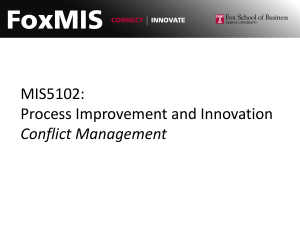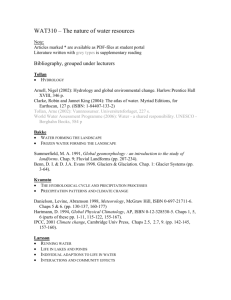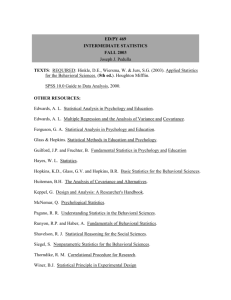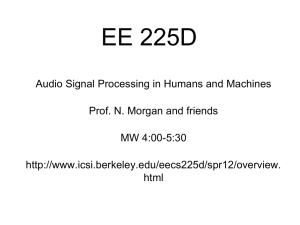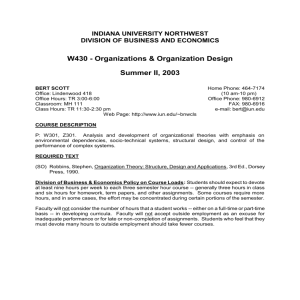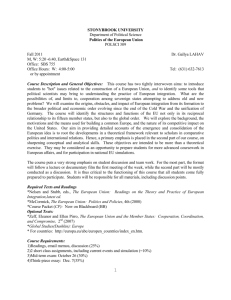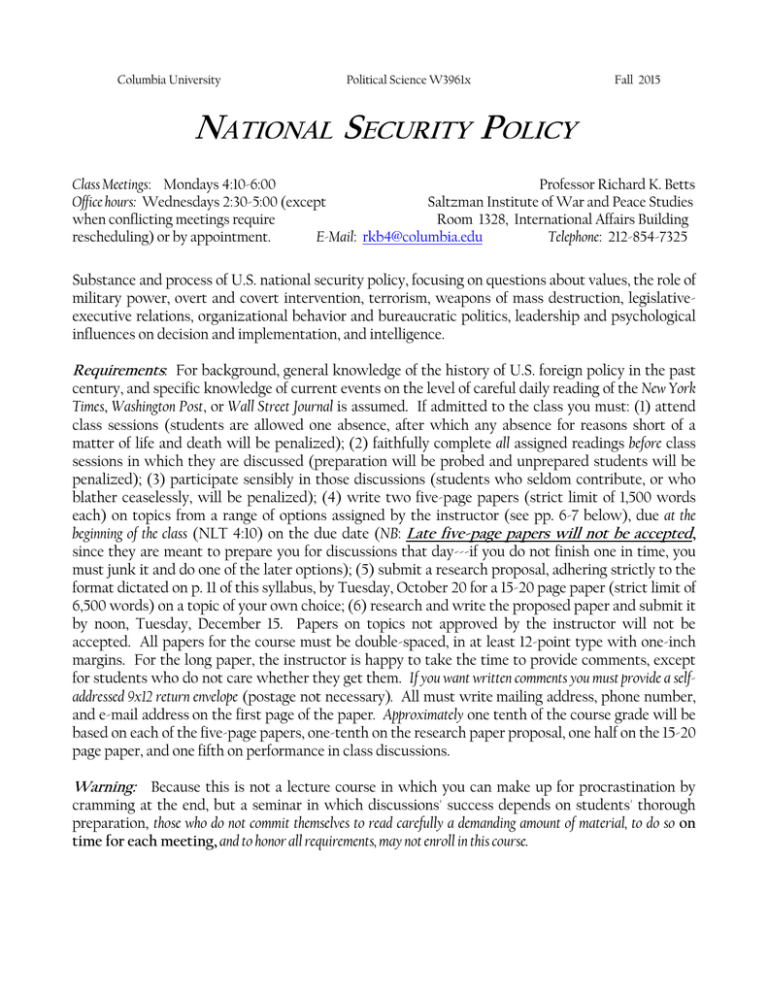
Columbia University
Political Science W3961x
Fall 2015
NATIONAL SECURITY POLICY
Class Meetings: Mondays 4:10-6:00
Professor Richard K. Betts
Office hours: Wednesdays 2:30-5:00 (except
Saltzman Institute of War and Peace Studies
when conflicting meetings require
Room 1328, International Affairs Building
rescheduling) or by appointment.
E-Mail: rkb4@columbia.edu
Telephone: 212-854-7325
Substance and process of U.S. national security policy, focusing on questions about values, the role of
military power, overt and covert intervention, terrorism, weapons of mass destruction, legislativeexecutive relations, organizational behavior and bureaucratic politics, leadership and psychological
influences on decision and implementation, and intelligence.
Requirements: For background, general knowledge of the history of U.S. foreign policy in the past
century, and specific knowledge of current events on the level of careful daily reading of the New York
Times, Washington Post, or Wall Street Journal is assumed. If admitted to the class you must: (1) attend
class sessions (students are allowed one absence, after which any absence for reasons short of a
matter of life and death will be penalized); (2) faithfully complete all assigned readings before class
sessions in which they are discussed (preparation will be probed and unprepared students will be
penalized); (3) participate sensibly in those discussions (students who seldom contribute, or who
blather ceaselessly, will be penalized); (4) write two five-page papers (strict limit of 1,500 words
each) on topics from a range of options assigned by the instructor (see pp. 6-7 below), due at the
beginning of the class (NLT 4:10) on the due date (NB: Late five-page papers will not be accepted,
since they are meant to prepare you for discussions that day---if you do not finish one in time, you
must junk it and do one of the later options); (5) submit a research proposal, adhering strictly to the
format dictated on p. 11 of this syllabus, by Tuesday, October 20 for a 15-20 page paper (strict limit of
6,500 words) on a topic of your own choice; (6) research and write the proposed paper and submit it
by noon, Tuesday, December 15. Papers on topics not approved by the instructor will not be
accepted. All papers for the course must be double-spaced, in at least 12-point type with one-inch
margins. For the long paper, the instructor is happy to take the time to provide comments, except
for students who do not care whether they get them. If you want written comments you must provide a selfaddressed 9x12 return envelope (postage not necessary). All must write mailing address, phone number,
and e-mail address on the first page of the paper. Approximately one tenth of the course grade will be
based on each of the five-page papers, one-tenth on the research paper proposal, one half on the 15-20
page paper, and one fifth on performance in class discussions.
Warning: Because this is not a lecture course in which you can make up for procrastination by
cramming at the end, but a seminar in which discussions' success depends on students' thorough
preparation, those who do not commit themselves to read carefully a demanding amount of material, to do so on
time for each meeting, and to honor all requirements, may not enroll in this course.
2
I.
Introduction
9/14/15
Stephen Peter Rosen, “An Empire, if You Can Keep It,” The National Interest, No. 71 (Spring 2003)
Lee Feinstein and Anne-Marie Slaughter, “A Duty to Prevent,” Foreign Affairs 83, no. 1 (January/
February 2004)
Barry R. Posen, "The Case for Restraint," The American Interest 3, no. 2 (November/December 2007)1
Stephen Sestanovich, Maximalist: America in the World from Truman to Obama (Knopf, 2014), Prologue
II.
Ideals and Interests2
Louis Hartz, The Liberal Tradition in America (Harcourt, Brace, 1955), chap. 11
George Kennan, American Diplomacy, 1900-1950 (University of Chicago Press, 1951), chaps.1-6
Walter Russell Mead, Special Providence (Knopf, 2002), chaps. 1, 2, 7
John D. Steinbruner, Principles of Global Security (Brookings Institution Press, 2000), chap. 1
Eliot Cohen, “The ‘Kind of Thing’ Crisis,” American Interest 10, no. 3 (January/February 2015)
John J. Mearsheimer, “Why the Ukraine Crisis is the West’s Fault,” Foreign Affairs 93, no. 5
(September/October 2014)
III.
Primacy or Overreach?
9/28/15
Paul Kennedy, The Rise and Fall of the Great Powers (Random House, 1987), Introduction, pp. 514-535,
and Epilogue
Barry P. Bosworth and Robert Z. Lawrence, "America's Global Role: From Dominance to
Interdependence," in John D. Steinbruner, ed., Restructuring American Foreign Policy (Brookings
Institution, 1989)
Jim Manzi, “Keeping America’s Edge,” National Affairs, No. 2 (Winter 2010)
William C. Wohlforth, "The Stability of a Unipolar World," International Security 24, no. 1 (Summer
1999)
Christopher Layne, “The Unipolar Illusion Revisited: The Coming End of the United States'
Unipolar Moment,” International Security 31, no. 2 (Fall 2006)
1
For those interested in the fully developed form of Posen’s argument see his book, Restraint: A New Foundation for
U.S. Grand Strategy (Cornell University Press, 2014).
2
Due to obligation to lecture in SIPA’s Conceptual Foundations course during normal W3961 meeting time on
September 21 this session cannot meet then and will be rescheduled.
3
Regional Case: The USA and China
IV.
10/5/15
Robert O. Keohane and Joseph S. Nye, Jr., "Power and Interdependence," in Richard K. Betts, ed.,
Conflict After the Cold War: Arguments on Causes of War and Peace, Third Edition (Pearson-Longman,
2008), pp. 161-167
Robert Gilpin, "Hegemonic War and International Change," in Betts, ed., Conflict After the Cold War
G. John Ikenberry, "The Rise of China and the Future of the West," Foreign Affairs 87, no. 1
(January/February 2008)
John J. Mearsheimer, The Tragedy of Great Power Politics, Second Edition (Norton, 2014), chapter 11
Optional November 2-3 Vacation Reading: Richard K. Betts, American Force: Dangers,
Delusions, and Dilemmas in National Security (Columbia University Press,
2012), chap. 8
Military Power I: Missions and Priorities
V.
10/12/15
Barry R. Posen and Andrew L. Ross, “Competing Visions for U.S. Grand Strategy,” International
Security 21, no. 3 (Winter 1996/97)
Eric A. Nordlinger, Isolationism Reconfigured (Princeton University Press, 1995), chaps. 1-3.
Steinbruner, Principles of Global Security, chap. 4
John Hillen, "Superpowers Don't Do Windows," Orbis 41, no. 2 (Spring 1997)
Optional Thanksgiving Vacation Reading: Betts, American Force, chaps. 1, 3, 6, 10-12
Unconventional Threats
VI.
10/19/15
Paul Pillar, Terrorism and U.S. Foreign Policy (Brookings Institution Press, 2001), chaps. 4, 5, 8
John Mueller, Overblown: How Politicians and the Terrorism Industry Inflate National Security Threats, and
Why We Believe Them (Free Press, 2006), Introduction and chap. 1
P.W. Singer and Allan Friedman, Cybersecurity and Cyberwar (Oxford University Press, 2014), Part
II (pp. 67-165
Optional Christmas Vacation Reading: Betts, American Force, chap. 5
NB:
Research Paper Proposals Due Tuesday, October 20
4
VII.
Political Intervention
10/26/15
U.S. Senate Select Committee to Study Governmental Operations with Respect to Intelligence
Activities, Staff Report: Covert Action in Chile 1963-1973, 94th Cong., 1st sess., 1975
Morton H. Halperin, "Guaranteeing Democracy," Foreign Policy No. 91 (Summer 1993)
Samuel P. Huntington, "Human Rights and American Power," Commentary 72, no. 3 (September
1981)
Samuel P. Huntington, The Clash of Civilizations and the Remaking of World Order (Simon and Schuster,
1996), chap. 12
VIII.
Constitutional Constraints on Policymaking
11/9/15
Louis Henkin, Constitutionalism, Democracy, and Foreign Affairs (Columbia University Press, 1990),
chap. 3
David Fagelson, “The Constitution and National Security: Covert Action in the Age of Intelligence
Oversight,” Journal of Law and Politics 5, no. 2 (Winter 1989)
The War Powers Resolution (Public Law 93-148, H.J. Res.542, 87 Stat. 555, November 7, 1973)
Louis Fisher, Presidential War Power, Third Edition (University Press of Kansas, 2013), chaps. 6,9, 10
IX.
Organizational Complexity and Political Control
11/16/15
Charles E. Lindblom, "The Science of 'Muddling Through'," Public Administration Review 19, no. 2
(Spring 1959)
Graham T. Allison, "Conceptual Models and the Cuban Missile Crisis," American Political Science
Review 63, no. 3 (September 1969)3
Stephen D. Krasner, ""Are Bureaucracies Important? (Or Allison Wonderland)," Foreign Policy No.
7 (Summer 1972)
Edward Wilson, “Thank You, Vasili Arkhipov, the Man Who Stopped Nuclear War,”
theguardian.com, October 27, 2012
Morton H. Halperin and Priscilla Clapp, with Arnold Kanter, Bureaucratic Politics and Foreign Policy,
Second Edition (Brookings Institution Press, 2006), chaps. 3, 5, 7, 13-15
3
Allison produced a more detailed book in 1971, updated and revised in 1999. In years after Allison's original research
a few examples he used, based on interviews, were found to be inaccurate. The article is assigned here for its brevity,
and as a survey of organizational and political impediments to rational decision and implementation, not as a fully
accurate account of events in the missile crisis. If you wish, you may read the full version of the theory and case study
instead of the 1969 article: Graham Allison and Philip Zelikow, Essence of Decision: Explaining the Cuban Missile
Crisis, Second Edition (Longman, 1999). See also Ernest R. May and Philip D. Zelikow, eds., The Kennedy Tapes:
Inside the White House During the Cuban Missile Crisis (Harvard University Press, 1997) or Sheldon M. Stern, Averting
the “Final Failure”: John F. Kennedy and the Secret Cuban Missile Crisis Meetings (Stanford University Press, 2003).
5
X.
Leadership: Psychology, Beliefs, and Action
11/23/15
Alexander L. George and Juliette L. George, Woodrow Wilson and Colonel House (Dover, 1964), chaps.
1, 2, 11
Edwin A. Weinstein, James William Anderson, and Arthur S. Link, “Woodrow Wilson’s Political
Personality: A Reappraisal,” Political Science Quarterly 93, no. 4 (Winter 1978-79)
John Steinbruner, The Cybernetic Theory of Decision (Princeton University Press, 1974), chaps. 1 ,3, 4
Daniel Kahneman, Thinking Fast and Slow (Farrar, Straus and Giroux, 2011), chaps. 1, 7, 8, 13, 19, 20
and Appendix A.
-
XI.
Military Power II: Civil-Military Relations
11/30/15
Samuel P. Huntington, The Soldier and the State (Harvard University Press, 1957), pp. 80-97,
143-157, 189-192
Eliot A. Cohen, Supreme Command: Soldiers, Statesmen, and Leadership in Wartime (Free Press,
2002), chaps. 1, 7
Richard Kohn, “Coming Soon: A Crisis in Civil-Military Relations,” World Affairs (Winter 2008)
Peter D. Feaver and Richard Kohn, “The Gap: Soldiers, Civilians and their Mutual
Misunderstanding,” National Interest No.61 (Fall 2000)
Colin L. Powell with Joseph Persico, My American Journey (Random House, 1995), pp. 558-586
Optional Intersession Vacation Reading: Richard K. Betts, Soldiers, Statesmen, and Cold War Crises,
Second Edition (Columbia University Press, 1991); Betts, American Force, chap. 9.
XII.
Intelligence: Knowledge, Policy, and Politics
12/7/15
Halperin and Clapp with Kanter, Bureaucratic Politics and Foreign Policy, chaps. 8, 9
Richard K. Betts, “Two Faces of Intelligence Failure: September 11 and Iraq’s Missing WMD,”
Political Science Quarterly 122, no. 4 (Winter 2007-08)
U.S. House of Representatives, Permanent Select Committee on Intelligence, Iran: Evaluation of U.S.
Intelligence Performance Prior to November 1978, Staff Report, January 1979.
John Horton, “Mexico, The Way of Iran?” International Journal of Intelligence and Counterintelligence 1,
no. 2 (1986)
Nigel Inkster, “The Snowden Revelations: Myths and Misapprehensions,” Survival 56, no. 1
(February-March 2014)
Optional Spring Vacation Reading: Richard K. Betts, Enemies of Intelligence: Knowledge
and Power in National Security (Columbia University Press, 2007).
6
XIII. Military Power III: How Do Policymakers Overreach or Get It Right?
12/14/15
Sestanovich, Maximalist, chaps. 4, 7
James C. Thomson, “How Could Vietnam Happen? An Autopsy,” Atlantic Monthly (April 1968)
George Bush and Brent Scowcroft, A World Transformed (Knopf, 1998), pp. 488-492
Stephen Biddle, “Afghanistan’s Legacy: Emerging Lessons of an Ongoing War,” Washington
Quarterly 37, no. 2 (Summer 2014)
Optional Summer Beach Reading: Leslie H. Gelb with Richard K. Betts, The Irony of Vietnam
(Brookings Institution, 1979); Richard K. Betts, “Blowtorch Bob in Baghdad,”
The American Interest 1, no. 4 (Summer 2006); Betts, American Force, chap. 7.
Short Paper Options
Write on two questions. Waiting to do the last option (November 20) will be dangerous, since no late
paper will be accepted on that date without severe reduction in grade (and no late paper will be
accepted under any conditions before the last session), no matter whether a sudden case of malaria
interferes with your writing the night before, your computer eats the draft, or a mugger takes it from
you on your way to class. For all options until the last, if you start a paper but cannot finish in time to
hand it in before class begins, you must junk it and do one of the subsequent choices. Papers may not
be just summary descriptions of what others have said, or just statements of your own opinion. They
must be interpretive and analytical, supporting arguments with evidence and logic by exploiting the
relevant assigned readings. What do the readings imply for an answer, which of conflicting arguments
are most relevant or persuasive, and what other issues should be involved in answering the question?
2. Ideals and Interests (September 21)
In what respects do the Ukraine crisis or other current issues in national security policy evoke
the question of whether U.S. policy is or should be affected by American values?
3. Primacy or Overreach? (September 28)
For what reasons should American policymakers strive---or not---to maintain and exploit
global primacy?
4. Regional Case: The USA and China (September 29)
Should the United States want China’s economic growth and prosperity to continue?
6. Unconventional Threats (October 5)
Has the United States overreacted to the danger of terrorism?
counterargument to your answer and why is it unconvincing?
What is the best
7
7. Political Intervention (October 26)
“Whether U.S. intervention is secret or open does not matter; the ends rather than the means
are what matter.” Discuss.
9. Organizational Complexity and Political Control (November 16)
Do the structures and processes of government condemn national security policy to
irrationality?
11. Military Power II: Civil-Military Relations (November 20)
Is military resistance to civilian authority always wrong?
Advice on Research and Analytical Writing
For short papers on assigned topics, be sure that you (1) answer the question, and (2) make the
best possible use of the appropriate readings to make your case. If points in readings apart from those
assigned are especially relevant, use them, but do not neglect to exploit fully the assigned readings for
the topic. What issues are implicit in the question, and how do the readings address them, either directly
or by implication? If the readings point to different answers, which is more convincing, and why?
For these and any other papers you ever do, write clearly, directly, grammatically, and
economically. Avoid cryptic or prolix constructions. Confusing prose indicates confused thought. You
may find it helpful to read George Orwell, "Politics and the English Language," which is reprinted in
many collections, such as Peter Davison, ed., assisted by Angus and Sheila Davison, The Complete Works of
George Orwell, vol. 17: I Belong to the Left, 1945 (London: Secker and Warburg, 1998).
For the short papers, you may refer to the assigned readings by noting the author and page
number in parentheses. Anything else cited, and all citations in the long research paper, must conform to
normal academic citation conventions. If you have the slightest doubt about what they are, consult a reputable
style manual, or look at footnote form in a university press book or political science journal, or look at the
form used on this syllabus. Do not confuse the form for citation in footnotes with that for bibliographies. You may
use any of the three standard alternatives, but the instructor’s first preference is footnotes, second is
endnotes, and last is the convention of appending a bibliography and citing specific references with the
author's name, date of publication, and page number in parentheses at the appropriate point in the text.
On all papers, but especially the long research paper, organize your analysis and presentation
carefully. In the introduction, state clearly and concisely (1) what the question is that you are addressing;
(2) why it is important; and (3) what your argument is. Make clear to the reader where you are going,
but keep the introduction short. The conclusion to the paper should not simply repeat what you have
said in summary form, but should weave together the strands in the body of the paper and show how the
progression of the analysis leads to the two or three points that are the bottom line.
8
The bulk of the paper between the introduction and conclusion should marshal logic and
evidence to test your hypothesis. Figure out what evidence is both relevant and available. This can be
compilations of data on whatever phenomenon you are considering---for example, trends in defense
budgets, or foreign aid to certain countries, or GDPs of countries in question, and so forth. Evidence can
also come from case studies of comparable events in the past. For example, if you are investigating the
effectiveness of military intervention, you might compare one or a few cases of success with one or a few
of failure, and decide what similarities or differences among the cases best point to the most relevant
conclusion. Keep the problem of researchability in mind as you choose a topic. Some interesting
questions are only subject to speculation and intuition. You need to address a question that interests
you, but which is also subject to analysis, that is, one on which historical evidence or current data can be
brought to bear to suggest an answer beyond intuition. Addressing an issue prominent in the past
(which will still have implications for present and future) is the easiest way to bring evidence to bear,
especially solid documentary evidence.
In framing your analysis, be sensitive to the question of how one would know whether what you
believe is true or false. Does all the relevant evidence you have confirm your argument or lead to another
conclusion? If the evidence is consistent with your explanation, is it consistent with different
interpretations as well? Why are counterarguments to your position wrong or inadequate? Is there
enough evidence available to reach a confident conclusion?
An original piece of research is not simple description, or simple assertion of opinion. It must
involve some measure of theoretical description, explanation, or prediction. Theoretical description
means identifying some pattern that clarifies understanding of a class of events. Explanation and
prediction mean figuring out causes and effects---why did certain things happen (explanation), or how
can observed patterns or causes give clues to what is likely to happen under particular circumstances in
the future (prediction)? If you want to assert an opinion, fine, but support it with analysis of the sort just
mentioned---that is, if you believe policy on issue “x” should be “y,” show why the study of cases
comparable to “x” demonstrates the logic of “y.”
Keep in mind the distinction between interesting data and relevant data. That is, the evidence
you cite must bear on the question you are asking.
As you take notes in the course of research in the library, do not forget to jot down the complete
citation for the source, and the page number for each point. You will not want to have to waste time later
going back to find them when you need to cite points from that source in the paper.
You may rely on secondary sources to support your analysis and supply evidence, and for certain
subjects this may be the only feasible approach. Nevertheless, papers that utilize primary sources
(documents, memoirs, interviews) will be especially well-regarded. You are not expected to travel
outside New York to exploit primary sources available elsewhere, so unless you are exceptionally
ambitious, you will probably be limited to using official documents in the Columbia library collections or
on the Internet (but heed the reservations about the Internet noted below). The Senate and House
committees on Armed Services, Foreign Relations, and Intelligence publish many useful reports and
hearings transcripts on issues that they address. The Foreign Relations of the United States series published
by the State Department (available right downstairs in Lehman Library) is the invaluable source of
9
declassified documents for any area of U.S. policymaking to the 1980s. The Annual Report of the Secretary of
Defense (known informally as the “Posture Statement”) contains official explanations of military force
structure and programs. One easily accessible source of primary material is the Columbia library’s Oral
History Collection. There are numerous other official sources you can reach through the library or
Internet. Reference librarians should be able to assist you in finding appropriate documentary
collections.
A partial list of periodicals likely to have useful articles for various topics in national security:
Academic Journals
International Security
Diplomatic History
Security Studies
Journal of Strategic Studies
Journal of Military History
Foreign Policy Analysis
Armed Forces and Society
Peacekeeping
International Journal of Intelligence and Counterintelligence
Intelligence and National Security
International Organization
World Politics
International Studies Quarterly
Journals of Commentary and Opinion
Foreign Affairs
The National Interest
The American Interest
Survival
Washington Quarterly
Foreign Policy
Orbis
Commentary
World Policy Journal
World Affairs
Specialized Professional and Trade Journals
Naval War College Review
U.S. Naval Institute Proceedings
Parameters: Journal of the Army War College
Military Review
Army
Air University Review [to 1988]
Airpower Journal [after 1988]
JFQ: Joint Force Quarterly
Foreign Service Journal
10
Armed Forces Journal International
Defense Week
Defense News
Inside the Pentagon
Jane’s Defense Weekly
Studies in Intelligence [unclassified issues]
Of course much valuable material can be obtained on the Internet. Do not, however, indulge in
the slothful mistake which is now unfortunately common among students of browsing the Internet as a
substitute for library research. Most of the material on the Internet is recent; only ignoramuses believe that
“old” sources are ipso facto inferior or irrelevant. Moreover, the bulk of material on the Internet is garbage,
much of it trivial, irrelevant, and of unreliable provenance. It is easy to waste vast amounts of time
surfing through it. The Internet is not a library; you cannot count on material found there to remain
there, and to be retrievable, forever. If you rely on anything from the Internet as evidence to cite, be sure
to print and keep a hard copy of it.
There are numerous guides to research methods and epistemological issues. You are not required
to look at any of them, although doing so will not hurt your chances of constructing an impressive
analysis. Examples include Gary King, Robert O. Keohane, and Sidney Verba, Designing Social Inquiry
(Princeton University Press, 1994) and Stephen Van Evera, Guide to Methodology for Students of Political Science
(Cornell University Press, 1997). A shorter and more lively and readable classic, one likely to be
appreciated by non-professional scholars such as yourselves, is E. H. Carr, What Is History? (Vintage, 1961).
Guidelines for the Research Paper Proposal Due October 20
Begin thinking about your research paper topic immediately. If later sessions of the course are on
subjects within which you think a topic of interest might lie, skip ahead to those sections of the syllabus
and scan the assigned readings to help spur your thinking. If you have a general idea of the subject area
that interests you, but are unsure about a specific topic or how to formulate a researchable question,
consult the instructor for advice (do not wait until shortly before the proposal is due if you want
considered recommendations).
Your paper topic may be on anything concerning U.S. national security policy that is connected to
topics on this syllabus. If you are interested in a question about current or future policy you need to
determine how evidence from the past will answer the question and select the right case studies or data
to explore.
No later than September 28 go to the library and investigate the range of books and other
sources that bear on the potential topics you have in mind. (Do not, however, spend time in the first
stage carefully reading such books or documents. Scan them quickly to see what may be helpful, look
11
more carefully at anything that seems exactly on point, but wait until you have a firmer sense of your
topic before investing substantial time in lengthy specific sources.) As you go along in focusing your
topic, compile a bibliography of sources that you intend to use.
The proposal may not be more than 350 words in length (excluding bibliography). Do not
deviate from the stipulated format and length limit. The purpose of the proposal is not to present a
preliminary version of the paper, but to indicate that you know what you are doing as you begin the
process of developing it. Write only what is necessary to demonstrate that with clarity, simplicity, and
directness. The proposal must be presented under four headings:
1. Question and Issue: What are you investigating and why should anyone care? This section
should be less than 50 words.
2. Hypotheses and Tentative Argument: What are potential answers to the question? Which
seems likely to be correct? (As you develop the paper you are free to reach conclusions different
from those anticipated at this stage. That is the purpose of research.) Be sure that your argument
is a direct answer to the question posed in (1). This section should be less than 100 words.
3. Research Plan: How do you intend to analyze the question? What evidence – historical cases or
data compilations – will you use to test hypotheses and illustrate your argument? This is the most
important part of the proposal, and the one that usually proves most deficient. It should constitute about twothirds of the prose proposal (i.e., excluding bibliography).
4. Bibliography: What sources have you consulted or do you intend to consult to guide your
research and provide data? These should include some combination of books, articles, think
tank papers, and official publications (e.g., congressional hearings or departmental reports).

